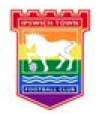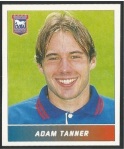 Narrator [a soft Scottish voice]: In a small office in the centre of the busy Suffolk town of Ipswich, a meeting is being held to discuss the financial strategy for the next football season. John Fletcher, joint Bespoke Global Deliverance Provider and his co-worker, David Hitchins, arrive in the car park almost simultaneously. John, casually dressed in cashmere sweater and jeans, is chaining his bike to a newly-painted blue railing, while the more urbane David, sporting a smart blazer unbuttoned over his crisp white shirt, prefers to travel in a classic Alfa Romeo Moltotraballante 4Ci. Joining them in the boardroom are Head of Brand Experience, Graham Bobbins and Lead Business Logic Analyst, Wendy Ramsey. Head of Performance, the gruff, tell-it-like-it-is Yorkshireman, Mick Mack, has sent his apologies.
Narrator [a soft Scottish voice]: In a small office in the centre of the busy Suffolk town of Ipswich, a meeting is being held to discuss the financial strategy for the next football season. John Fletcher, joint Bespoke Global Deliverance Provider and his co-worker, David Hitchins, arrive in the car park almost simultaneously. John, casually dressed in cashmere sweater and jeans, is chaining his bike to a newly-painted blue railing, while the more urbane David, sporting a smart blazer unbuttoned over his crisp white shirt, prefers to travel in a classic Alfa Romeo Moltotraballante 4Ci. Joining them in the boardroom are Head of Brand Experience, Graham Bobbins and Lead Business Logic Analyst, Wendy Ramsey. Head of Performance, the gruff, tell-it-like-it-is Yorkshireman, Mick Mack, has sent his apologies.
John: I haven’t got much time. I’ve got a video conference with the Bermuda branch of the supporters’ club in fifty minutes, so shall we… ?
Wendy [tentatively]: Sorry, John… Just wondered if anyone would like a frothy coffee or an iced bun…
John [irritably]: I don’t think…
David: Great idea, Wend. Do they do pasties?
John [even more irritably]: I think we should just get on… [Wendy leaves the room]… Graham, we’ve already decided on the price structure for next season based on a demographic analysis of Cambridge. Graham, as Head of Brand Experience, you’re going to have a key role in convincing the people of this fine university town that their increased contribution is essential to the future progress of the brand. How do you think you’re going to achieve that?
Graham [looks thoughtful]: Well…
John: David?
David: Well, we need to convince people that they’re getting value for money. Which of course they are.
John: Good.
David: Obviously people in Cambridge can’t expect that to mean the same as people in – say – Chelsea do.
John [nods]: I know where you’re coming from.
David: What I mean is, it’s all very well, people going on all the time about what a historic city Cambridge is. I mean, it has been historic, I grant you that, but it [floundering a little]… isn’t all that historic any more.
Graham: Because that’s totally like living in the past, isn’t it?
Wendy [coming back into the boardroom with several paper bags]: I could only get you a sticky bun, David. With pink icing. I hope you don’t mind… And I got you a Florentine, John. I know you didn’t say, but…
John: Thank you. That’s really kind.
Wendy: If anyone wants a sandwich for later…
John: I think we need to press on now. So we have to persuade the people of Cambridge to stop living in the past. Good. How do we do that… Graham?
Graham [staring at his iPhone]: Er…
Wendy: Ipswich.
John [irritably]: I’m sorry, Wendy but we are going to run out of time soon.
Wendy: This is Ipswich.
John: Ipswich?
Wendy: Ipswich. This is Ipswich. Not Cambridge.
John: Shit.
David: Shit!
Graham: Totally.
Wendy: But you must know that.
John [vaguely]: Of course. … Good. So, Graham, how do we persuade the people of Ipswich that it’s the future they should be interested in?
Graham: We’ve got some really good Ipswich Town Keep Calm key rings. Just in.
John: Good. But I was really thinking more of how we get across to people that it’s worth their while continuing to spend money, more and more money, year upon year, on something that is becoming less and less enjoyable.
Wendy: Faith? Loyalty?
John: Woolly. Thinking more of…. ?
David: FFP?
Graham [consulting Google]: Fresh Frozen Plasma? Flexible Food Packaging? Fairly Frequent Penalties?
David: Financial Fair Play.
John: Good. Go on.
David: We say something like this: in an ideal world we’d have liked to have held prices across the board but with Financial Fair Play coming in, it’s meant we’ve had to review the pricing.
John: Good. Go on.
David: We tell them we’re listening, yeah? We’ve met quite a few people from supporters’ groups. We’ve taken what they’ve said about ticket prices on board but we have no choice.
John: I’m liking this.
Wendy: This is great.
Graham: Totally.
David [feeling he’s on a roll]: We feel it’s very fair when you consider what you get for it.
Wendy: What do the supporters get for it, David?
David: Hold on, Wendy. That kind of detail can be sorted out later.
John: This is good. Carry on.
David: Progress. Success. Positivity. Achievement. Excitement. Wobble.
John, Wendy & Graham [in unison]: Wobble?
David: Yes. Wobble. Or, to be exact, no wobble.
Graham: Yeah, no wobble. Duh!
John: Right. Of course… . Expand on that a little if you will, David.
David: We say to our fans ‘this is not the time to wobble.’ ”
John: Brilliant! Superb. OK, people, let’s call it a day. Get on to the usual contacts in the local media and let’s get that message out there. From now on, this is a wobble-free football club.
Wendy: Just one thing, John. If this whole FFP thing gets kicked out because of the current legal action by other Championship clubs, does that mean we can bring ticket prices down again?
John: I really am a bit pushed for time now, Wendy. Maybe you… [Gets out of his seat.]
Wendy: And – just a thought – if a relatively small number of people decide not to renew their season tickets because of the price rise – it’s a small rise, I know, but I think some supporters are feeling a bit fed up and finances are tight – so, if say about two hundred season ticket holders decide not to renew, won’t that wipe out any extra income that we’ll derive from charging an extra nine pounds or so? Just a thought, as I said.
John: Perhaps you could drop me a memo on that one… ? [Moves towards door.]
Wendy: Oh, and – sorry, this is a small point, I know, but it might be important. What effect will this – along with other factors like the years of decline, the quality of the football, the succession of players on loan, the high prices for away fans – have on the crowds, and the atmosphere? Almost seems as if we’re in some kind of vicious circle here. People might start finding other things to spend their hard-earned money on and it could be hard to win them back once their support has been lost.
John [holding his mobile to his ear]: Ah, I think that’s Bermuda now. Must take this call.
by Susan



 Posted by itfcturnstileblues
Posted by itfcturnstileblues 




